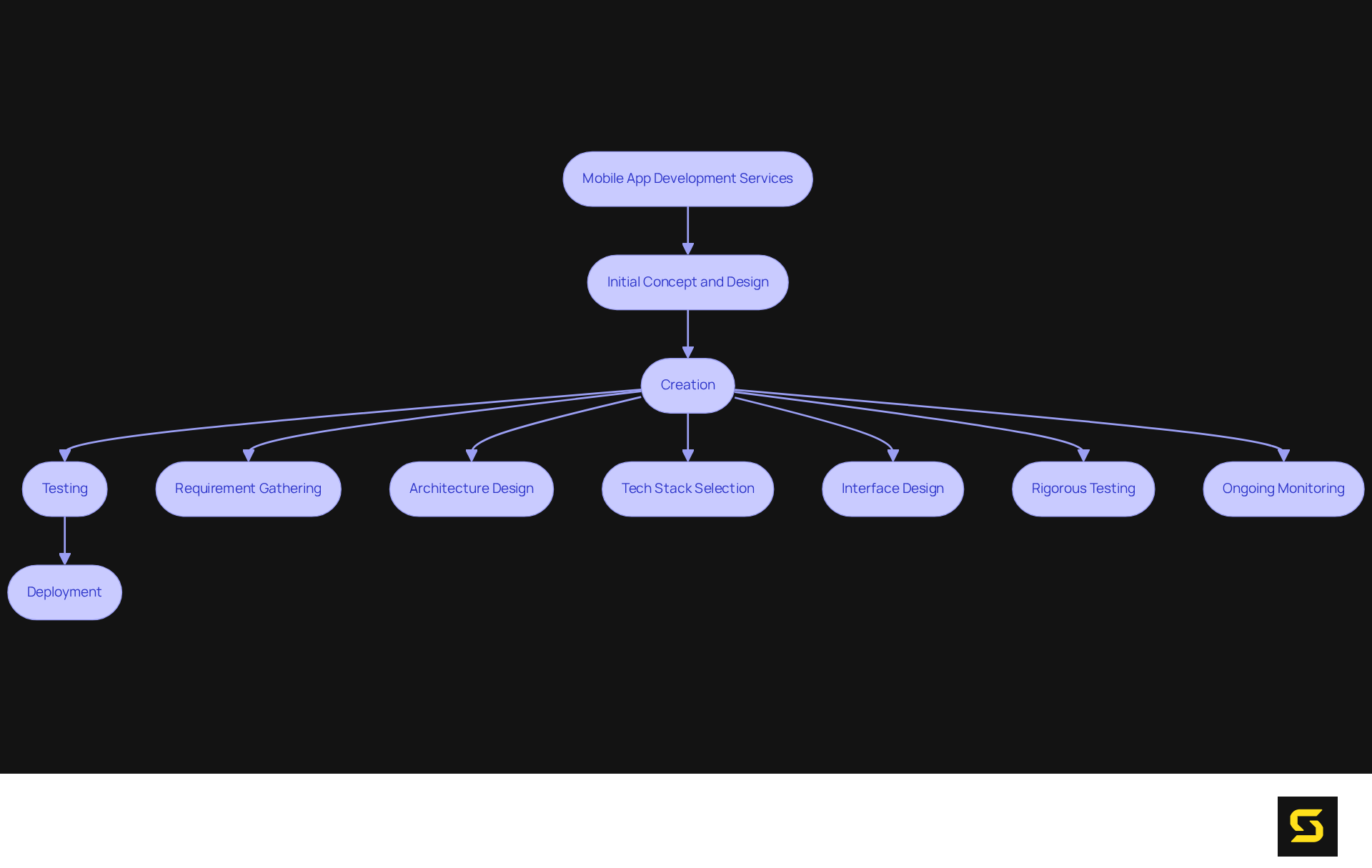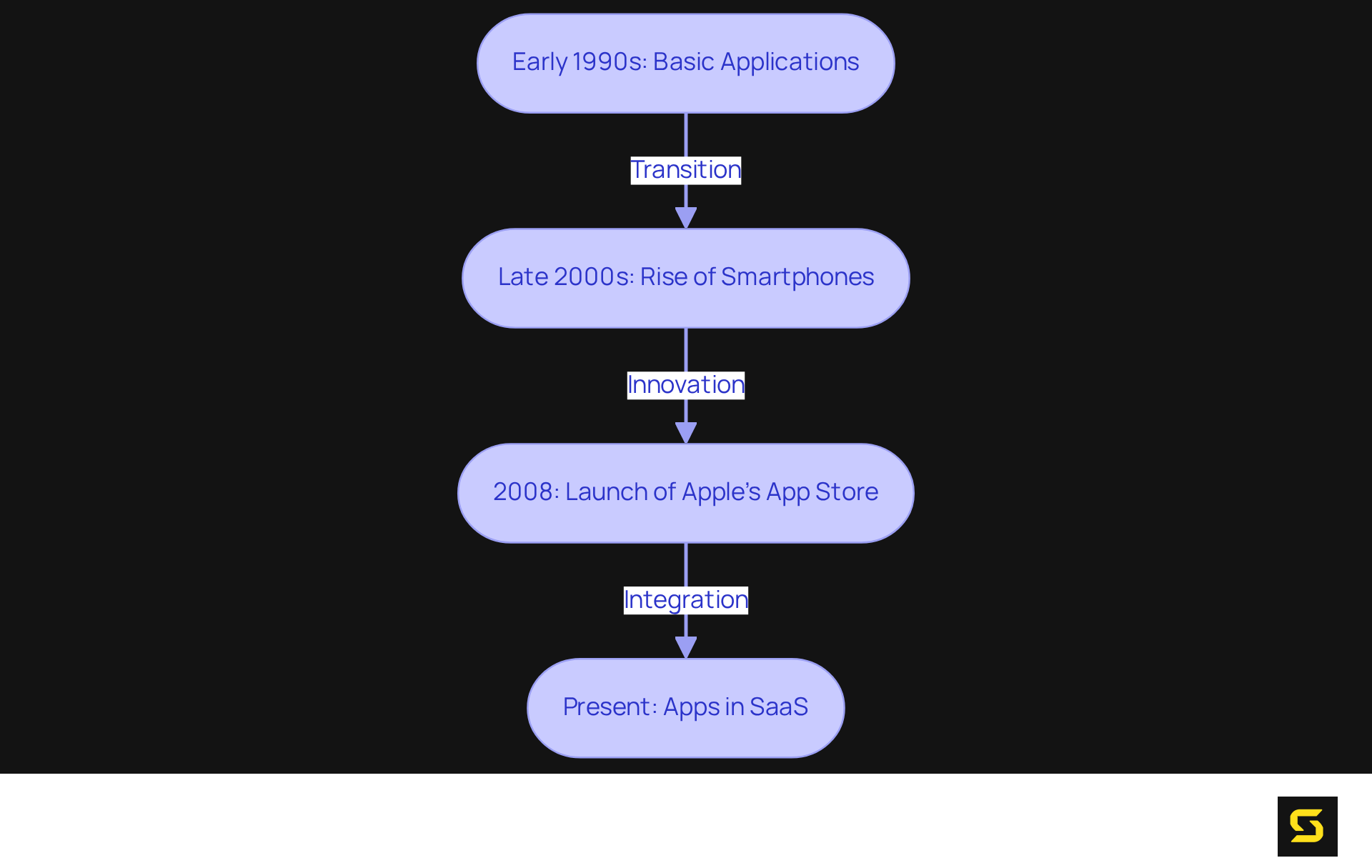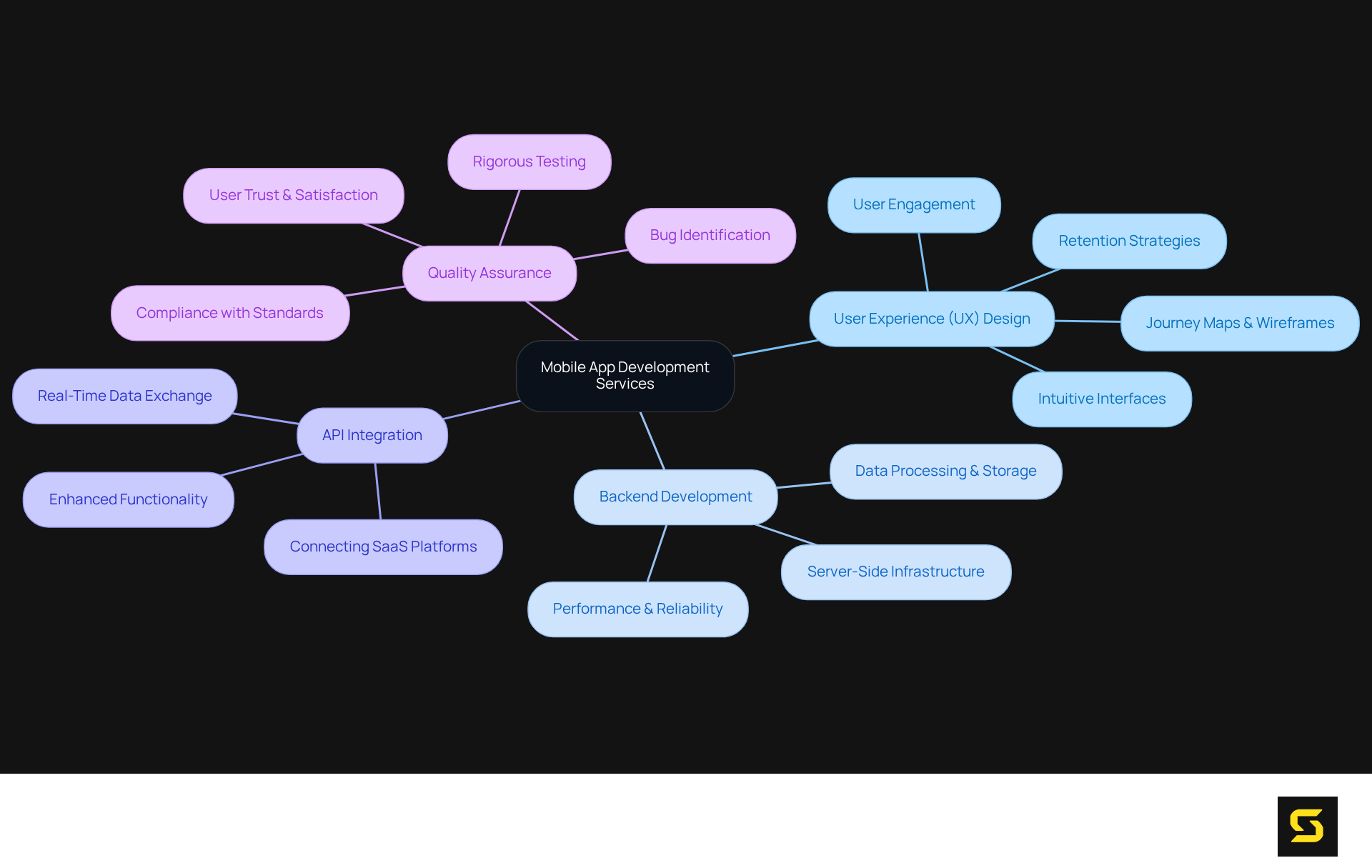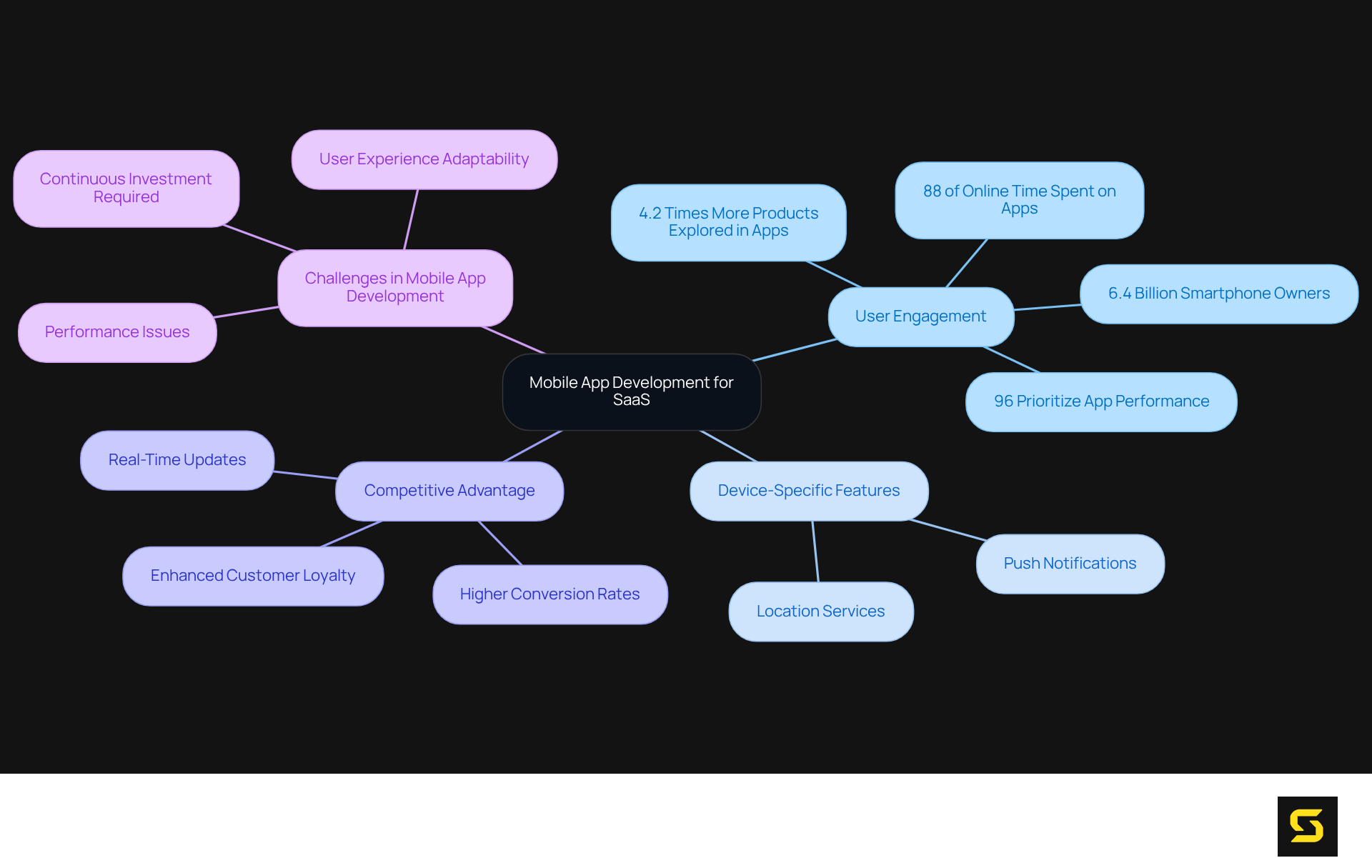Overview
Mobile app development services are essential for the success of Software as a Service (SaaS) products, significantly enhancing user engagement and accessibility through customized applications for mobile devices. A well-designed mobile app not only elevates the user experience and cultivates customer loyalty but also empowers SaaS companies to utilize smartphone features effectively. This strategic positioning is critical in a competitive landscape where over 88% of online time is devoted to apps. By investing in mobile app development, SaaS businesses can secure their place in the market and drive sustained growth.
Introduction
The rapid evolution of technology has fundamentally transformed how businesses engage with their customers, positioning mobile app development services as a cornerstone for success, particularly within the Software as a Service (SaaS) sector.
As the demand for seamless, on-the-go access to applications escalates, companies face a unique opportunity to enhance user engagement and satisfaction through meticulously crafted mobile solutions.
However, with rising production costs and security concerns casting shadows over the development process, SaaS providers must adeptly navigate these challenges to create applications that not only fulfill user expectations but also drive significant business growth.
Defining Mobile App Development Services
The mobile app development service represents a comprehensive process meticulously designed to produce software applications tailored for handheld devices, including smartphones and tablets. This process encompasses several critical stages:
- Initial concept and design
- Creation
- Testing
- Deployment
For Software as a Service (SaaS) firms, app creation is not merely important; it is essential. It facilitates the extension of web-based applications to portable platforms, significantly enhancing accessibility and user engagement. In fact, projections for 2025 indicate that the U.S. application market will expand at a CAGR of 14.1% from 2024 to 2030, underscoring the pivotal role of app creation in today’s competitive landscape.
Successful mobile app development services have consistently demonstrated that integrating mobile capabilities leads to increased customer satisfaction and retention, making it a strategic priority for SaaS providers. The creation process typically involves:
- Requirement gathering
- Architecture design
- Tech stack selection
- Interface design
- Rigorous testing
- Ongoing monitoring post-launch through tools like Google Analytics and New Relic
This structured approach ensures that SaaS applications not only meet user needs but also adapt to evolving market demands, ultimately driving business growth. However, it is crucial to address challenges such as high production costs and security concerns to ensure successful outcomes.

The Evolution and Context of Mobile App Development Services
The evolution of application creation services began in the early 1990s with the launch of basic applications, such as Java games and calculators, which offered limited functionalities. However, the landscape transformed dramatically with the advent of smartphones and application stores in the late 2000s, leading to an unprecedented surge in app development. A pivotal moment arrived in 2008 with the introduction of Apple’s App Store, which empowered developers to reach a wider audience and innovate at an accelerated pace. Today, applications are indispensable components of SaaS offerings, providing individuals with the flexibility to access services anytime and anywhere. This shift towards application-first strategies compels SaaS firms to prioritize their mobile app development service to maintain competitiveness in an increasingly digital environment.
The integration of APIs has become essential, enabling developers to incorporate functionalities without the need to start from scratch. Statistics reveal that US adults spend over four hours each day on their phones, with 88% of that time dedicated to applications, underscoring the critical role these platforms play in user engagement and retention. Nevertheless, challenges such as consumer experience, adaptability, accessibility, and quality persist in the current landscape. As the demand for seamless experiences on smartphones continues to grow, the adoption of advanced technologies like 5G, AR, and VR, combined with a focus on user-centered design principles, will be crucial for the future success of mobile app development services in the SaaS sector.

Key Components of Mobile App Development Services
The foundation of mobile app development service is built upon several critical components:
- User experience (UX) design
- Backend development
- API integration
- Quality assurance
UX design is paramount, focusing on the creation of intuitive interfaces that significantly enhance user engagement and satisfaction. This structured approach includes the development of Journey Maps, clickable wireframes, visual interfaces, and motion design, all of which are vital for maintaining user interest. A well-crafted UX not only attracts users but also retains them, as evidenced by the fact that 90% of internet time on devices is spent on applications. This statistic underscores the necessity of a seamless user experience.
Backend development is integral to ensuring that the app functions seamlessly with the server-side infrastructure, facilitating efficient data processing and storage. This aspect is particularly crucial for Software as a Service (SaaS) applications, where performance and reliability are of utmost importance.
API integration serves as a key link, connecting the mobile app with existing SaaS platforms, enabling real-time data exchange, and enhancing overall functionality. This integration allows companies to leverage their current systems while providing users with a cohesive experience.
Quality assurance processes are vital to the development cycle, involving rigorous testing to identify bugs and performance issues prior to the app's release to consumers. This proactive approach ensures a smooth user experience, which is essential for maintaining trust and satisfaction. Additionally, adherence to global data privacy standards is critical for safeguarding app security in today's digital landscape.
By focusing on these interconnected elements, companies can leverage a mobile app development service to create applications that not only meet client needs but also drive engagement and growth in the competitive SaaS environment.

The Importance of Mobile App Development Services for SaaS Products
Mobile app development service is essential for SaaS products, significantly enhancing engagement and accessibility. With over 6.4 billion smartphone owners globally and U.S. adults dedicating 88% of their online time to applications, the demand for on-the-go access to SaaS solutions has reached unprecedented levels. A well-designed application not only elevates user experience but also cultivates customer loyalty by providing seamless access to services anytime, anywhere.
By leveraging device-specific features such as:
- Push notifications
- Location services
SaaS companies can create personalized experiences that drive engagement. This strategic investment in application development positions SaaS providers to adeptly meet evolving customer needs and secure long-term success. As industry leaders assert, the ability to engage users through smartphone platforms is vital, with 96% of individuals prioritizing app performance over cost.
Furthermore, users explore 4.2 times more products per session within apps compared to websites, underscoring the critical role of applications in boosting engagement. Consequently, companies that utilize a mobile app development service are poised to gain a competitive advantage in the digital landscape. David Gasparyan emphasizes that a commitment to mobile platforms is indispensable for success.

Conclusion
Mobile app development services are indispensable for the success of Software as a Service (SaaS) companies, fundamentally transforming user interactions with applications and significantly enhancing engagement. By extending web-based services to mobile platforms, these services not only improve accessibility but also markedly increase customer satisfaction and retention rates. As the mobile app market continues its rapid expansion, prioritizing development services is essential for SaaS providers aiming to maintain a competitive edge in a digital-first world.
In this article, we explored various facets of mobile app development services, including:
- The structured process of app creation
- The evolution of these services
- The key components that contribute to successful applications
By emphasizing user experience, backend development, API integration, and quality assurance, we highlighted how these elements synergize to create applications that not only meet user needs but also drive business growth. Moreover, the importance of leveraging device-specific features and understanding user behavior was underscored as crucial for fostering engagement and loyalty.
Ultimately, embracing mobile app development services is not merely a strategic choice; it is a necessity for SaaS companies striving to thrive in an increasingly mobile-centric market. As user expectations evolve and the demand for seamless, on-the-go access to services intensifies, investing in robust mobile app solutions becomes paramount. Companies that recognize and act on this trend will enhance their service offerings and secure a competitive advantage in the ever-evolving landscape of SaaS.
Frequently Asked Questions
What is mobile app development?
Mobile app development is a comprehensive process designed to create software applications specifically for handheld devices like smartphones and tablets.
What are the key stages involved in mobile app development?
The key stages of mobile app development include initial concept and design, creation, testing, and deployment.
Why is app creation essential for Software as a Service (SaaS) firms?
App creation is essential for SaaS firms as it extends web-based applications to portable platforms, enhancing accessibility and user engagement.
What is the projected growth of the U.S. application market by 2025?
The U.S. application market is projected to expand at a compound annual growth rate (CAGR) of 14.1% from 2024 to 2030.
How does mobile app development impact customer satisfaction and retention?
Successful mobile app development services lead to increased customer satisfaction and retention by integrating mobile capabilities, making it a strategic priority for SaaS providers.
What does the app creation process typically involve?
The app creation process typically involves requirement gathering, architecture design, tech stack selection, interface design, rigorous testing, and ongoing monitoring post-launch.
How do tools like Google Analytics and New Relic contribute to mobile app development?
Tools like Google Analytics and New Relic are used for ongoing monitoring post-launch to ensure that the app meets user needs and adapts to evolving market demands.
What challenges must be addressed in mobile app development?
Challenges such as high production costs and security concerns must be addressed to ensure successful outcomes in mobile app development.





